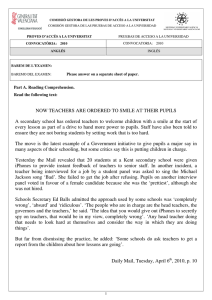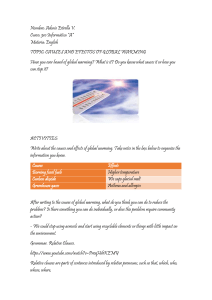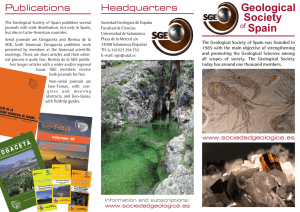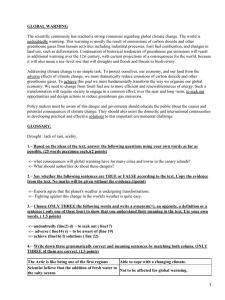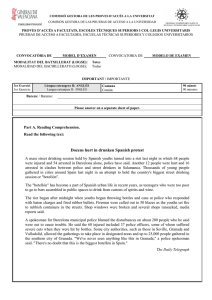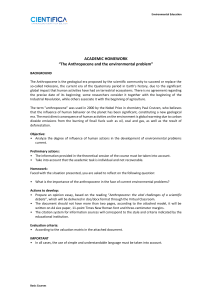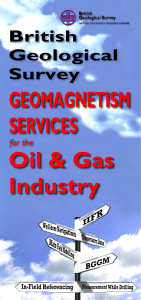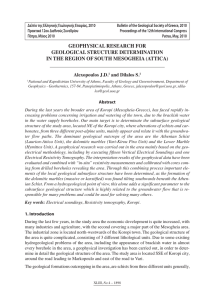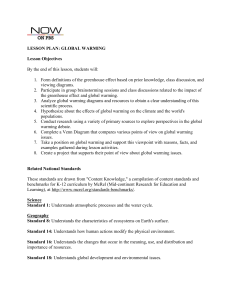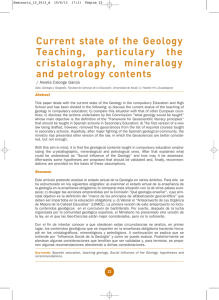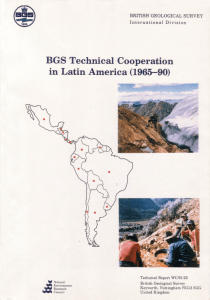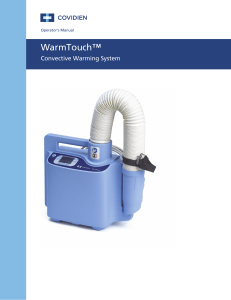I. Answer the following questions using your own words but taking
Anuncio
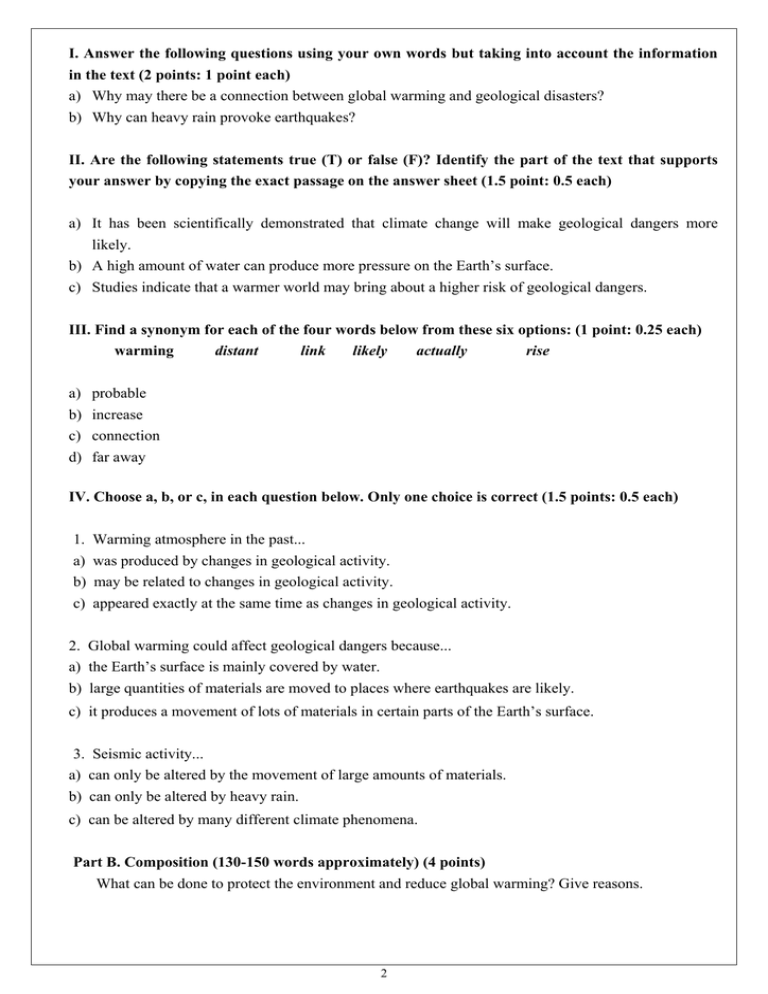
I. Answer the following questions using your own words but taking into account the information in the text (2 points: 1 point each) a) Why may there be a connection between global warming and geological disasters? b) Why can heavy rain provoke earthquakes? II. Are the following statements true (T) or false (F)? Identify the part of the text that supports your answer by copying the exact passage on the answer sheet (1.5 point: 0.5 each) a) It has been scientifically demonstrated that climate change will make geological dangers more likely. b) A high amount of water can produce more pressure on the Earth’s surface. c) Studies indicate that a warmer world may bring about a higher risk of geological dangers. III. Find a synonym for each of the four words below from these six options: (1 point: 0.25 each) warming distant link likely actually rise a) b) c) d) probable increase connection far away IV. Choose a, b, or c, in each question below. Only one choice is correct (1.5 points: 0.5 each) 1. a) b) c) Warming atmosphere in the past... was produced by changes in geological activity. may be related to changes in geological activity. appeared exactly at the same time as changes in geological activity. 2. Global warming could affect geological dangers because... a) the Earth’s surface is mainly covered by water. b) large quantities of materials are moved to places where earthquakes are likely. c) it produces a movement of lots of materials in certain parts of the Earth’s surface. 3. Seismic activity... a) can only be altered by the movement of large amounts of materials. b) can only be altered by heavy rain. c) can be altered by many different climate phenomena. Part B. Composition (130-150 words approximately) (4 points) What can be done to protect the environment and reduce global warming? Give reasons. 2 COMISSIÓ GESTORA DE LES PROVES D’ACCÉS A LA UNIVERSITAT COMISIÓN GESTORA DE LAS PRUEBAS DE ACCESO A LA UNIVERSIDAD PROVES D’ACCÉS A LA UNIVERSITAT CONVOCATÒRIA: PRUEBAS DE ACCESO A LA UNIVERSIDAD CONVOCATORIA: SETEMBRE 2011 Llengua estrangera II: ANGLÈS SEPTIEMBRE 2011 Lengua extranjera II: INGLÉS BAREM DE L’EXAMEN: BAREMO DEL EXAMEN: Please answer on a separate sheet of paper. OPCIÓ B/OPCIÓN B Part A. Reading Comprehension. Read the following text: ARE YOUR KIDS AWAKE? THEY’RE ONLINE The average young American now spends practically every waking minute — except for the time in school — using a smart phone, computer, television or other electronic device, according to a new study. Those ages 8 to 18 spend more than seven and a half hours a day with such devices, compared with less than six and a half hours five years ago, when the study was last conducted. And that does not count the hour and a half that youths spend texting, or the half-hour they talk on their cell phones. And because so many of them are multitasking — say, surfing the Internet while listening to music — they pack on average nearly 11 hours of media content into that seven and a half hours. The study’s findings shocked its authors, who had concluded in 2005 that use could not possibly grow further, and confirmed the fears of many parents whose children are constantly tethered to media devices. It found, moreover, that heavy media use is associated with behavior problems and lower grades. The third in a series, the study found that young people’s media consumption grew far more in the last five years than from 1999 to 2004, as sophisticated mobile technology like iPods and smart phones brought media access into teenagers’ pockets and beds. On average, young people spend about two hours a day consuming media on a mobile device, the study found. They spend almost another hour on “old” content like television or music delivered through newer pathways like the Web site Hulu or iTunes. Youths now spend more time listening to or watching media on their cell phones, or playing games, than talking on them. Tamar Lewin The New York Times 21st January, 2010 3 I. Answer the following questions using your own words but taking into account the information in the text. (2 points: 1 point each) a. Why were the authors surprised about the results of their study? b. According to the text, how do the authors explain the increase in media consumption among the young? II. Are the following statements true (T) or false (F)? Identify the part of the text that supports your answer by copying the exact passage on the answer sheet. (1.5 point: 0.5 each) a. Young Americans spend every minute they are awake using electronic devices. b. Multitasking increases the average of media consumption. c. Heavy media consumption is related to poor school performance. III. Find a synonym for each of the four words below from these six options: (1 point: 0.25 each) pack findings fears tethered behavior delivered a. b. c. d. IV. suspicions compress results attached Choose a, b, or c, in each question below. Only one choice is correct. (1.5 points: 0.5 each) 1. The title of this text suggests that… a. young people spend most of their time awake using electronic devices. b. parents may think their kids are in bed, sleeping, but instead they are on the Internet. c. kids have behavioral problems because they surf the Internet too much. 2. Youth… a. spend an average of seven and a half hours on their cell phones. b. spend less time using electronic devices than before. c. spend more time texting than talking on their cell phones. 3. Young people use their cell phones… a. mostly to talk to their friends. b. less frequently than in the previous study. c. mostly to consume media rather than to make calls. Part B. Composition (130 to 150 words approximately) (4 points) What kinds of media devices do you usually use and what for? 4 COMISSIÓ GESTORA DE LES PROVES D’ACCÉS A LA UNIVERSITAT COMISIÓN GESTORA DE LAS PRUEBAS DE ACCESO A LA UNIVERSIDAD PROVES D’ACCÉS A LA UNIVERSITAT CONVOCATÒRIA: PRUEBAS DE ACCESO A LA UNIVERSIDAD CONVOCATORIA: SETEMBRE 2011 Llengua estrangera II: ANGLÈS SEPTIEMBRE 2011 Lengua extranjera II: INGLÉS BAREM DE L’EXAMEN: BAREMO DEL EXAMEN: Please answer on a separate sheet of paper. OPCIÓ A/OPCIÓN A Part A. Reading Comprehension. Read the following text: SCIENTISTS CALL FOR RESEARCH ON CLIMATE LINK TO GEOLOGICAL DISASTERS Scientists today called for research into whether more volcanoes, earthquakes and tsunamis could be triggered by rising global temperatures under global warming. Significant warming of the atmosphere in the distant past can be linked to changes in geological activity, they say. Suggestions that climate change predicted for coming decades could bring similar changes remain speculative, but the scientists say there is enough evidence to take the threat seriously. Richard Betts, from Exeter, said: “It was previously assumed that there was no link at all between climate change and these events, but it is possible to speculate that climate change might make some events more likely. If we do get large amounts of climate change in the long term then we might see some impacts”. Experts say global warming could affect geological dangers such as earthquakes because of the way it can move large amounts of materials around on the Earth’s surface. Melting glaciers and rising sea levels affect the distribution of huge amounts of water, which release and increase pressures through the ground. Research suggests that the Earth’s surface can sometimes be so close to failure that small changes in surface pressure provoked by heavy rain can produce earthquakes. Actually, tropical storms, snowfall and shifting tides have all been linked to shifts in seismic activity. Bill McGuire, from University College London, says: “studies point towards increased risk in relation to a warmer world, and observations suggest that the rise in global temperatures may already be producing disasters in the earth’s surface”. David Adam, The Guardian, 9th April, 2010 1
